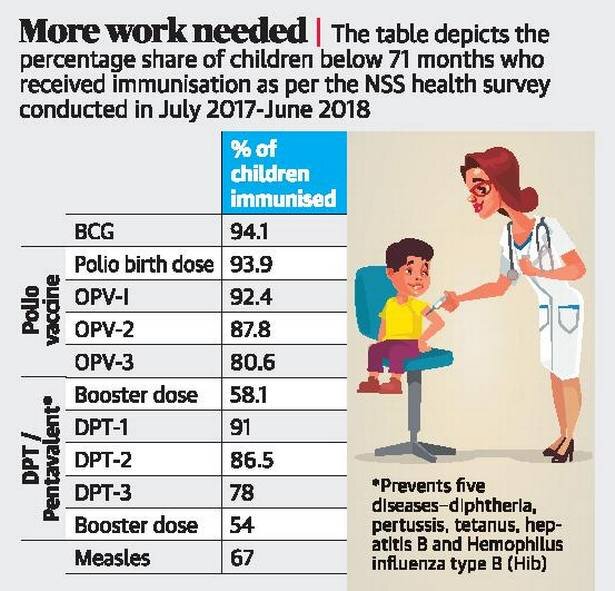Gap in Vaccination of Children | 09 Sep 2020
Why in News
According to the ‘Health in India’ report recently published by the National Statistical Organisation (NSO), the full immunisation programme is not completed among 40% of the children.
- The report is based on the 75th round of the National Sample Survey (July 2017-June 2018) on household social consumption related to health.
Full Immunisation
- It means that a child receives a cocktail of eight vaccine doses in the first year of life. This includes:
- BCG Vaccine: It is injected in a single dose shortly after birth, which protects against a childhood attack of tuberculosis.
- Measles Vaccine: Measles is a viral disease.
- Oral Polio Vaccine (OPV): It is given against polio virus. Its first dose is given at birth, followed by two more doses at intervals of four weeks.
- DPT/Pentavalent Vaccine: It is injected in three doses, which is meant to protect a child from diphtheria, pertussis or whooping cough, tetanus, Hepatitis B, and meningitis and pneumonia caused by haemophilus influenzae type B.
- Booster doses for OPV and DPT are also given between 16 and 24 months.
Key Points
- Data Analysis:
- Across the country, only 59.2% of children under five years are fully immunised.
- About 97% of children across the country received at least one vaccination — mostly BCG or the first dose of OPV at birth.
- Only 67% of children are protected against measles. Only 58% got their polio booster dose, while 54% got their DPT booster dose.
- States/UTs Specific Data:
- Best Performance: Manipur (75%), Andhra Pradesh (73.6%) and Mizoram (73.4%) recorded the highest rates of full immunisation.
- Poor Performance: Nagaland (12%), followed by Puducherry (34%) and Tripura (39.6%).
- In Delhi, less than half of all children are fully immunised.
- Issues Involved:
- The Covid-19 pandemic has already impacted the childhood vaccination programme.
- According to advocacy group Child Rights and You reports, only half of Indian families with children under five years were able to access immunisation services during the lockdown.
Way Forward
- Immunisation is a simple and effective way of protecting children from serious diseases. It not only helps protect individuals, it also protects the broader community by minimising the spread of disease. Therefore the government needs to remove any gap in immunisation.

